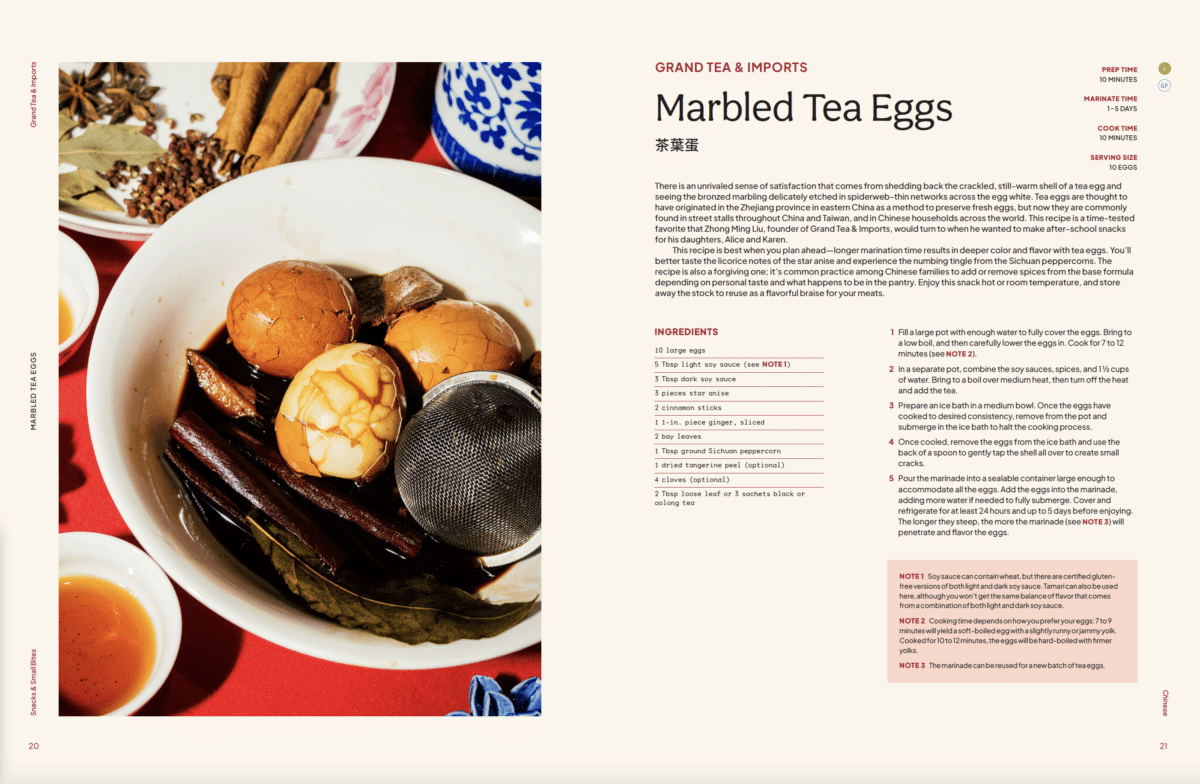Grand Tea & Imports Marbled Tea Eggs
There is an unrivaled sense of satisfaction that comes from shedding back the crackled, still-warm shell of a tea egg and seeing the bronzed marbling delicately etched in spiderweb-thin networks across the egg white. Tea eggs are thought to have originated in the Zhejiang province in eastern China as a method to preserve fresh eggs, but now they are commonly found in street stalls throughout China and Taiwan, and in Chinese households across the world. This recipe is a time-tested favorite that Zhong Ming Liu, founder of Grand Tea & Imports, would turn to when he wanted to make after-school snacks for his daughters, Alice and Karen.
This recipe is best when you plan ahead – longer marination time results in deeper color and flavor with tea eggs. You’ll better taste the licorice notes of the star anise and experience the numbing tingle from the Sichuan peppercorns. The recipe is also a forgiving one; it’s common practice among Chinese families to add or remove spices from the base formula depending on personal taste and what happens to be in the pantry. Enjoy this snack hot or room temperature, and store away the stock to reuse as a flavorful braise for your meats.
This recipe is reprinted from MADE HERE with permission from Send Chinatown Love.
Ingredients
- •10 large eggs
- •75 ml (5 tablespoons) light soy sauce (see NOTE1)
- •45 ml (3 tablespoons) dark soy sauce
- •3 pieces star anise
- •2 cinnamon sticks
- •2.5 cm (1 inch) piece ginger, sliced
- •2 bay leaves
- •15 ml (1 tablespoon) ground Sichuan peppercorn
- •1 dried tangerine peel (optional)
- •4 cloves (optional)
- •30 ml (2 tablespoons) loose leaf or 3 sachets black or oolong tea
READ MORE: Tea as a seasoning in cooking.


Preparation
Fill a large pot with enough water to fully cover the eggs. Bring to a low boil, and then carefully lower the eggs in. Cook for 7 to 12 minutes or to taste (see NOTE 2).
In a separate pot, combine the soy sauces, all the remaining ingredients EXCEPT the tea, and 355 ml (1½ cups) water. Bring to a boil over medium heat, then turn off the heat and add the tea.
Prepare an ice bath in a medium bowl. Once the eggs have cooked to desired consistency, remove from the pot and submerge in the ice bath to halt the cooking process.
Once cooled, remove the eggs from the ice bath and use the back of a spoon to gently tap the shell all over to create small cracks.
Pour the marinade into a sealable container large enough to accommodate all the eggs. Add the eggs into the marinade, adding more water if needed to fully submerge. Cover and refrigerate for at least 24 hours and up to 5 days before enjoying. The longer they steep, the more the marinade (see NOTE 3) will penetrate and flavor the eggs.
Notes
NOTE 1 Soy sauce can contain wheat, but there are certified gluten-free versions of both light and dark soy sauce. Tamari can also be used here, although you won’t get the same balance of flavor that comes from a combination of both light and dark soy sauce.
NOTE 2 Cooking time depends on how you prefer your eggs: 7 to 9 minutes will yield a soft-boiled egg with a slightly runny or jammy yolk. Cooked for 10 to 12 minutes, the eggs will be hard-boiled with firmer yolks.
NOTE 3 The marinade can be reused for a new batch of tea eggs.

